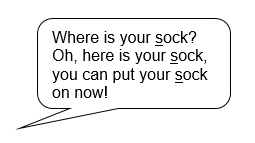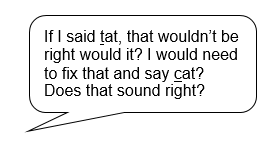It shows that you are interested in what they are saying and they see clearly the movements of your mouth when you are talking.
Children need to feel relaxed and confident in order to experiment with sounds and so change their speech patterns. Drawing too much attention to mispronunciations and making children repeat words is not helpful.

 Find another means to help the child get their point across.
Find another means to help the child get their point across.
Gesture
Asking them to show you/ point to it
Getting them/ you to draw
Problem solve and play detective
e.g. “Is it at home or nursery?”
“Is it another child?”
“Is it a game you have played?” etc
This will act as a natural model to help the child slow their rate down and help naturally improve clarity. If you model a slow, steady pace this will support the child to do so too.
Give the child special time or 1:1 if possible. Spend time playing a game or activity with them. Any attempts to talk will be within the context of the game and therefore make it easier for the listener to interpret and understand what the child is saying. Repeat back what the child has said showing them that they have been understood.
Help them to repeat and find other ways to tell you:
e.g. “Oh I have silly ears today- can you tell me again?”
“My goodness. I didn’t hear all of that – can you show me?”
This can sometimes lead you to agreeing to something you have no intention of letting the child do! Use the above strategies to get him to tell you another way.
Sometimes you have to admit that you don’t understand. Be as reassuring as possible or change the subject and focus on something positive if your child a confident communicator ask them to tell you more or show you.
This is quite normal. A child may articulate ‘s’ but say “tock” for “sock”. The child has to understand how to use the sound. This usually develops naturally. The best way to help is to repeat the word correctly so the child hears a good model.
You can give your child a good speech model by saying the word back the way he would if he could- emphasising the important sound e.g.


Your child has heard the important sound correctly produced 3 times and this will build up awareness and recognition of this sound.
Let them hear you ‘fix’ the error.


You don’t need to insist that your child copies but if they want to have a go- let them try!